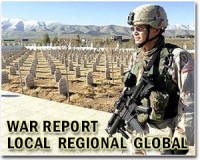| . |  |
. |
Quito (AFP) Sept 30, 2010 Ecuador's government declared a state of emergency Thursday saying rebel troops and police were staging a coup, after seizing the main airport and storming Congress in a mutiny over pay cuts. About 150 renegade troops seized a runway at Ecuador's international airport in the capital of the South American nation, as dozens of police protested against a new law which would strip them of some pay bonuses. President Rafael Correa, 47, a leftist ally of his Venezuelan counterpart Hugo Chavez, swiftly denounced what he called a coup bid. "It is a coup attempt led by the opposition and certain sections of the armed forces and the police," Correa, who has governed the country since 2007, told local television. "If anything happens to me, they will be responsible," he added, after seeking refuge in a hospital, blaming sections of the opposition and troops loyal to former president Lucio Gutierrez for the unrest. As tear gas was used on the streets of the capital to try to beat back crowds of police protestors, the government declared a state of emergency and vowed to use all means to restore order. Correa has vowed he will not bow in face of the protests. "No, I will not step back if they want to seize the barracks, if they want to leave the citizens defenseless and betray their mission," Correa told soldiers from Quito's main regiment earlier as he sought to calm tensions. "If you want to kill the president, he is here. Kill him if you want. Kill him if you can. Kill him if you are brave enough, instead of hiding in the crowd," he said in an impassioned speech. But tempers flared at the barracks, and the president had to leave when scuffles broke out and tear gas exploded near him. Overcome by the fumes he was taken out by stretcher to the nearby hospital. Correa was said to be meeting late Thursday with a delegation of the renegade police, after army chief Ernesto Gonzalez called on them to end their uprising. Gonzalez said that "troops would analyze the situation and since we are in a state of emergency, if it is needed we will intervene." But there were conflicting reports with the Vice President Lenin Moreno saying that Correa was being held inside the hospital, by rebel police who were trying to kidnap him. Security Minister Miguel Carvajal told reporters the armed forces "have received instructions to maintain public order and guarantee the rights of citizens." Dozens of police units took over government buildings in the country's other two main cities, Guayaquil and Cuenca, and Foreign Minister Ricardo Patino blamed the insurrection on "sectors aiming to overthrow the government." The unrest, which recalled a military-backed coup against the elected president in Honduras last year, rocked Ecuador's neighbors with many leaders swiftly coming out in his support. Its closest neighbors, Peru and Colombia, swift closed their joint borders with Ecuador. The main regional group, the Organization of American States (OAS), maintained that a coup was underway and in emergency talks was drawing up a resolution urging all sides to avoid violence. The White House expressed "full support" for Correa and called for a peaceful end to the crisis, while EU foreign policy chief Catherine Ashton urged all sides to refrain from violence. Correa was said to be considering dissolving Congress and holding snap elections to resolve the political crisis. Dozens of Correa supporters were meanwhile descending on the hospital where the president had sought refuge, vowing to rescue him. "Down with the coup, down with the enemies of the people," they chanted. The leftist Correa was re-elected last year to a second term at the helm of the country of some 14.5 million people. Since taking power in 2007, Correa has proven controversial because of his close ties to regional leftists like Chavez. The US-educated economist took a tough stance with investors and refused to repay foreign debt, in moves welcomed by supporters who blamed the effects of the economic crisis on unbridled free-market policies. His reelection was seen as giving some stability to the world's leading banana exporter that has seen three of its previous presidents -- between 1996 and 2006 -- ousted before the end of their terms.
Share This Article With Planet Earth
Related Links
 US and Europe toil to save Israel-Palestinian peace talks
US and Europe toil to save Israel-Palestinian peace talksRamallah, Palestinian Territories (AFP) Sept 30, 2010 US envoy George Mitchell held crucial talks with Palestinian leader Mahmud Abbas on Thursday and pledged to maintain intensive efforts to salvage peace talks with Israel. Keeping up the pressure, EU foreign policy chief Catherine Ashton was also in the region and met Abbas ahead of meetings on Friday with Israeli Prime Minister Benjamin Netanyahu. Speaking to reporters after two hours of ... read more |
|
| The content herein, unless otherwise known to be public domain, are Copyright 1995-2010 - SpaceDaily. AFP and UPI Wire Stories are copyright Agence France-Presse and United Press International. ESA Portal Reports are copyright European Space Agency. All NASA sourced material is public domain. Additional copyrights may apply in whole or part to other bona fide parties. Advertising does not imply endorsement,agreement or approval of any opinions, statements or information provided by SpaceDaily on any Web page published or hosted by SpaceDaily. Privacy Statement |